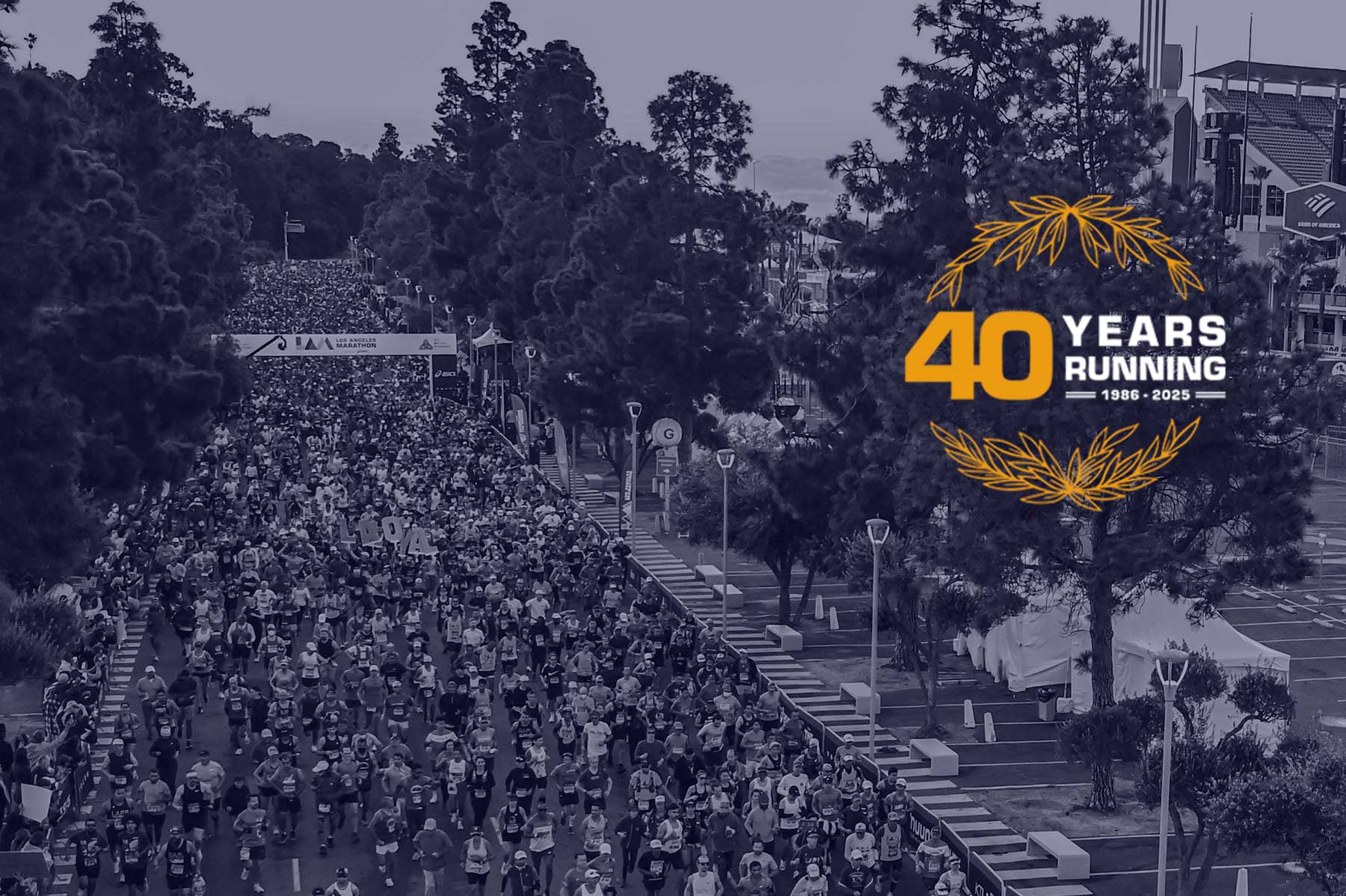
Course Entertainment
event title
Los Angeles Marathon
Los Angeles, CA, CA 92001 United States
2025 Los Angeles Marathon Course Entertainment
The 2025 Los Angeles Marathon course promises an exhilarating course with over 75 spirited cheer zones, more than 20 different entertainment activations, and enthusiastic spectators cheering you on from Stadium to the Stars!
Check out the 2024 Course Entertainment map complete with all the information below and more.
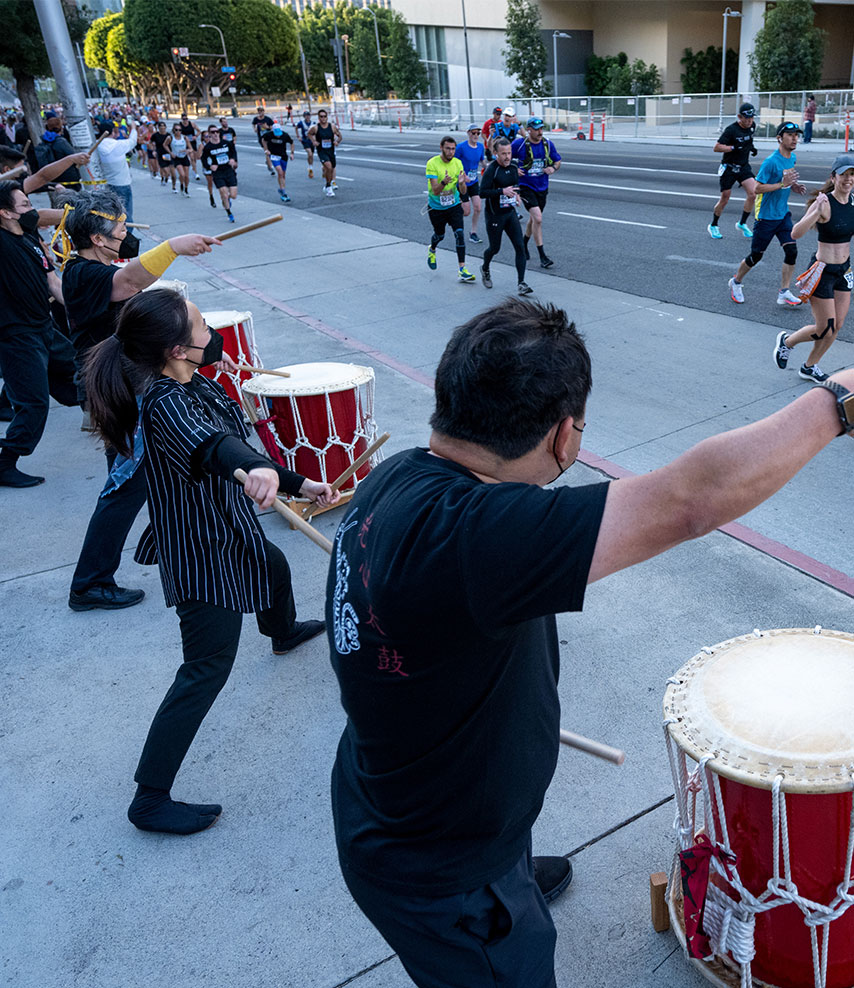
Course Entertainment
![]()
Be ready to be moved by the sounds and spirt of the course entertainment! The list below highlights entertainment from the 2024 Los Angeles Marathon.
- East wind Lion Dancers - Mile 1
- Koshin Taiko Drummers - Mile 4
- Sidle Entertainment Drumline - Mile 6
- Silverlake Conservatory of Music - Mile 8
- Greg Young Trio - Mile 10
- Rose City DJ - Mile 11
- Cheer LA - Mile 15
- Pink Mozart - Mile 17
- Rose City DJ - Mile 18
- LA Taiko Ichiza - Mile 19
- Dustland Fairytale (A Killers Cover Band) - Mile 20
- Rose City DJ - Mile 20/24
- New West Charter School Band - Mile 21
- Bake Some Noise - Mile 25
- Hawaiian Airlines Serenaders - Mile 25
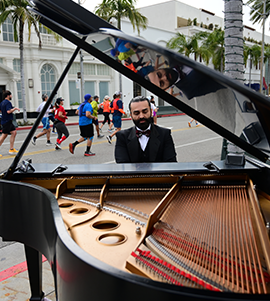
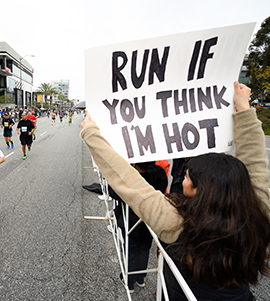
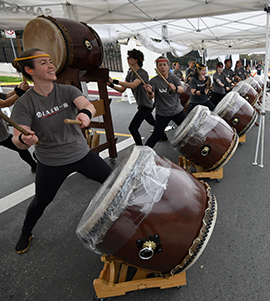

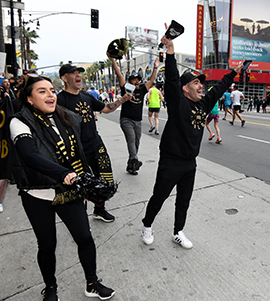
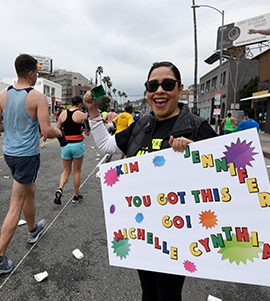
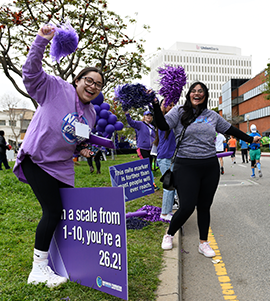
Charity & Run Club Cheer Zones
![]()
- AADAP, Inc.
- American Foundation for Suicide Prevention
- Angel City Pit Bulls
- beit T'Shuvah
- Cal-Rehab Foundation
- Children’s Hospital Los Angeles
- Claris Health
- Concern Foundation for Cancer Research
- Glioblastoma Foundation
- Guardian Revival
- Habitat for Humanity of Greater Los Angeles
- Hirshberg Foundation for Pancreatic Cancer
- Kitten Rescue
- NAMI Greater Los Angeles County
- National Brain Tumor Society
- Pancreatic Cancer Action Network
- Parkinson's Community Los Angeles (PCLA)
- Parkinson's Foundation
- Reading to Kids
- Special Olympics Southern California
- Still I Run
- Strides in Recovery
- Students Run LA
- Teen Cancer America
- The Association for Frontotemporal Degeneration
- The McCourt Foundation
- The Million Mile Project
- The Pablove Foundation
- WeGotThis.org
- Anaheim Run Club
- Black and Gold Running Club
- BlacklistLA
- Cafe Jam Run Club
- Dog Haus Running Club
- DTLA Running
- Eagle Rock Run Club
- Fleet Feet
- Friday Donut Run Club / Brews Bros
- Keep Runnin' Santa Ana
- Koreatown Run Club
- A. LEGGERS
- LA RUNNERS Club
- LA Running Club
- LADWPacers
- Loma Linda Lopers
- Los Angeles Frontrunners
- Mikkeller Running Club LA
- Movement Runners
- New Basin Blues
- Night Terrors Run Crew
- NS Team
- Pacer Nation
- Run for Grace
- Rundalay
- Runner's Hiii
- Running Locas
- Running Mamis
- Santa Clarita Runners
- She Runs This Town - La Verne
- Silver Lake Track Club
- South Bay Runners Club
- Struggle Bus LA
- Tempo Training Run Club
- Valley Runners LA
- Venice Run Club
Local Neighborhood Spotlights
![]()
The Los Angeles Marathon course takes you through some of the most interesting and beautiful LA neighborhoods including the following...
The community of Elysian Park includes the actual park, which is the second largest park in Los Angeles as well as Dodger Stadium, the third oldest ballpark in Major League Baseball and largest by seating capacity. Dodger Stadium has been home to the Los Angeles Dodgers since its opening in 1962 and has been host to games of eight World Series, the 1980 MLB All-Star Game, and the finals of the 2009 World Baseball Classic.
Built in 1938, Chinatown serves many different ethnic groups in Los Angeles. Although originally inhabited primarily by Chinese immigrants, the area has grown to include many Vietnamese, Cambodian, and Thai immigrants who began coming to the area after the Vietnam War. Chinatown remains a popular tourist destination with its stylized, modern Chinese architecture and countless curiosity shops, but mainly serves the local immigrant community.
Located in the oldest section of Downtown Los Angeles and a part of El Pueblo de Los Angeles Historic Monument, Olvera Street is a colorful marketplace reminiscent of old Mexico. Home of the Avila Adobe, the oldest structure in Los Angeles, Olvera Street was the heart of Mexican community life until 1848. A campaign in the 1920s sought to capitalize on a resurgence of Mexican culture and rebuild Olvera Street into a cultural center. In its present form, Olvera Street draws millions of visitors a year to its quaint, romantic vision of old Mexico.
As the cultural center for Japanese Americans in Southern California and one of only 3 official Japantowns in the United States, Little Tokyo plays a large role in Japanese-American relations. Although it is no longer an ethnic enclave for local Japanese, the area is still a focal point for Japanese celebrations and culture. Visitors flock to the area to take advantage of the traditional Japanese restaurants, shopping, and arts.
An affluent residential enclave in the early 20th century, Bunker Hill once housed lavish Victorian-style houses that became home to upper class residents of Los Angeles. In 1955, Bunker Hill was redeveloped into an area with modern plazas and buildings. It currently is home to several skyscrapers as well as the Los Angeles Music Center. Home to the Dorothy Chandler Pavilion, Ahmanson Theater, Mark Taper Forum, and Walt Disney Concert Hall, over a million people visit the Music Center each year to watch performances by its four internationally renowned performing arts companies.
The second oldest community in Los Angeles, Angeleno (Angelino) Heights is known for its concentration of Victorian style homes that has made it a popular backdrop for Hollywood. Although a large area of Angeleno Heights was destroyed to make way for the Hollywood Freeway, it is now recognized as a historic district, and any new construction has to resemble original architecture in scale and materials.
Once the home of the Los Angeles film industry, Echo Park has always attracted the creative, underground, and independent elements of society. Echo Park has been to home to many luminaries, among them, Ayn Rand, Steve McQueen, Leonardo DiCaprio, and Jackson Pollock. The dynamic community is known for its historic architecture (craftsman-style homes), diversity, and commitment to preserving the vibrant community.
A neighborhood known for its eclectic gathering of hipsters and creative types, Silver Lake is home to a wide variety of ethnic and socioeconomic groups. Silver Lake has become the center of alternative and indie rock in Los Angeles annually hosting two large street festivals that feature local musicians as well as national musicians, many of whom got their start in the area.
Named after Rancho Los Feliz, one of the first land grants in California, Los Feliz was part of the rancho and was developed into a bustling community. Bordering Griffith Park, Los Feliz is an affluent community that was home to many early movie studios including Walt Disney's first and second studios. Mickey Mouse was “born" in Los Feliz as Disney drew the first image of the character in his uncle's garage in Los Feliz.
Little Armenia was “born" when Los Angeles bestowed the name on the East Hollywood neighborhood in 2000. However, Little Armenia had been thriving with Armenian businesses and restaurants since the 1970s. Although no longer the major neighborhood for Armenians in Los Angeles, the community still features culturally based celebrations and traditions.
With the largest Thai population outside of Thailand, Los Angeles is home to the only Thai Town in the world. Thai Town began in the 1960s and further grew in the 80s and is home to many Thai restaurants, markets, and stores. Songkran, the Thai New Year, is the biggest celebration each year as Hollywood Blvd is closed down for a parade and entertainment.
Hollywood became famous in the early 1900s due to an influx of entertainment-related businesses. Quickly becoming synonymous with dreams of stardom, Hollywood began attracting tourists to the spots that were populated by film stars. Although most entertainment studios and broadcasters have moved from their original locations, Hollywood Blvd is still one of the biggest tourist destinations in all of Los Angeles. Hollywood & Highland Center is home to the Dolby Theatre, which annually hosts the Academy Awards. Also featured in Hollywood is the world-famous TCL Chinese Theatre (formerly Grauman's), the Pantages Theatre, and the Hollywood Walk of Fame.
The best-known portion of Sunset Blvd, the Sunset Strip is the name given to the stretch of the street that passes through West Hollywood. The Strip is known for its collection of boutiques, restaurants, rock clubs, and nightclubs. Since the 1960s, the area has transformed into a haven for music groups who perform at clubs including Whisky a Go Go, Pandora's Box, the London Fog, and Viper Room.
As part of “Route 66", the stretch of Santa Monica Blvd that runs through West Hollywood is home to the most popular gay and lesbian scene in Los Angeles. Home to gay nightclubs, bookstores, and cafes, Santa Monica Blvd represents civic and community pride for residents of the area. West Hollywood annually hosts “the largest street party in the world" every Halloween when the West Hollywood Halloween Carnival takes over Santa Monica Blvd.
Beverly Hills is home to one of the most affluent neighborhoods in all of California and anchors the area's “Platinum Triangle" with Bel Air and Holmby Hills. With the world-famous zip code of 90210 and destinations such as Rodeo Drive, Beverly Hills is known around the world as one of the most glamorous places to shop and visit. Because of its desirable location, Beverly Hills has long been residence to Hollywood elite who seek respite from the hustle and bustle of Los Angeles.
Century City is a small, but important business center as many law firms and executives with ties to the entertainment industry have offices there. Formerly a backlot for 20th Century Fox, the area has always had a strong connection to the entertainment industry with ABC Entertainment, MGM Studios, Univision Communications, and Creative Artists Agency all currently or formerly headquartered in Century City.
Home to UCLA, Westwood is an affluent community in West LA centered around the mixed residential and business high-rises on Wilshire Blvd. Westwood Village, a shopping district with a small-village atmosphere, is home to many upscale shops, restaurants, and the historic Fox and Bruin Theaters. Also located in Westwood is the Los Angeles California Temple, the second-largest temple operated by The Church of Jesus Christ of Latter-Day Saints, home to the Church's missionary efforts in Los Angeles.
The largest of the VA's health care campuses, the Los Angeles VA serves thousands of veterans every year. The sprawling campus features the Wadsworth Chapel, a Victorian style building built in 1900 as a Catholic-Protestant dual chapel that allowed both Catholic and Protestant soldiers to worship at the same time, on either side of a double brick wall. The Chapel has been closed since the 1971 Sylmar earthquake but was placed on the National Register of Historic Places in 1972.
Originally planted with soybeans and avocados, Bentwood is now one of the wealthiest neighborhoods in all of LA. Home to the Brentwood Country Mart, the Mart grew to fame as celebrities were used to grow its cachet. Because of the cozy, one-stop-shopping experience, celebrities helped popularize the location as it became a local, Hollywood haunt. Even today, celebrities are spotted frequently taking in the atmosphere and shopping at the Brentwood Country Mart.
